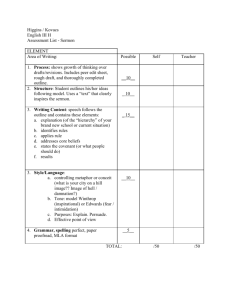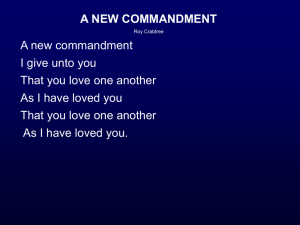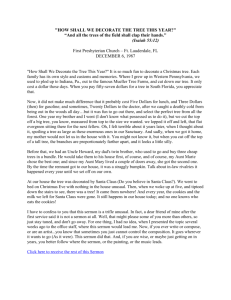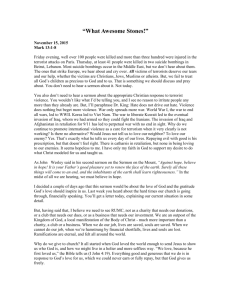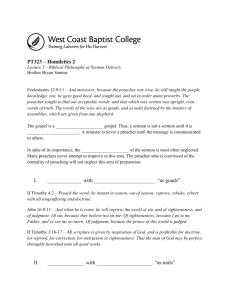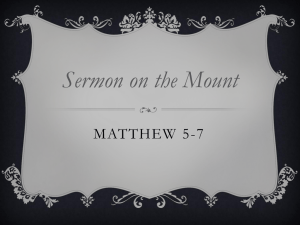Sunday, February 2, 2014
advertisement
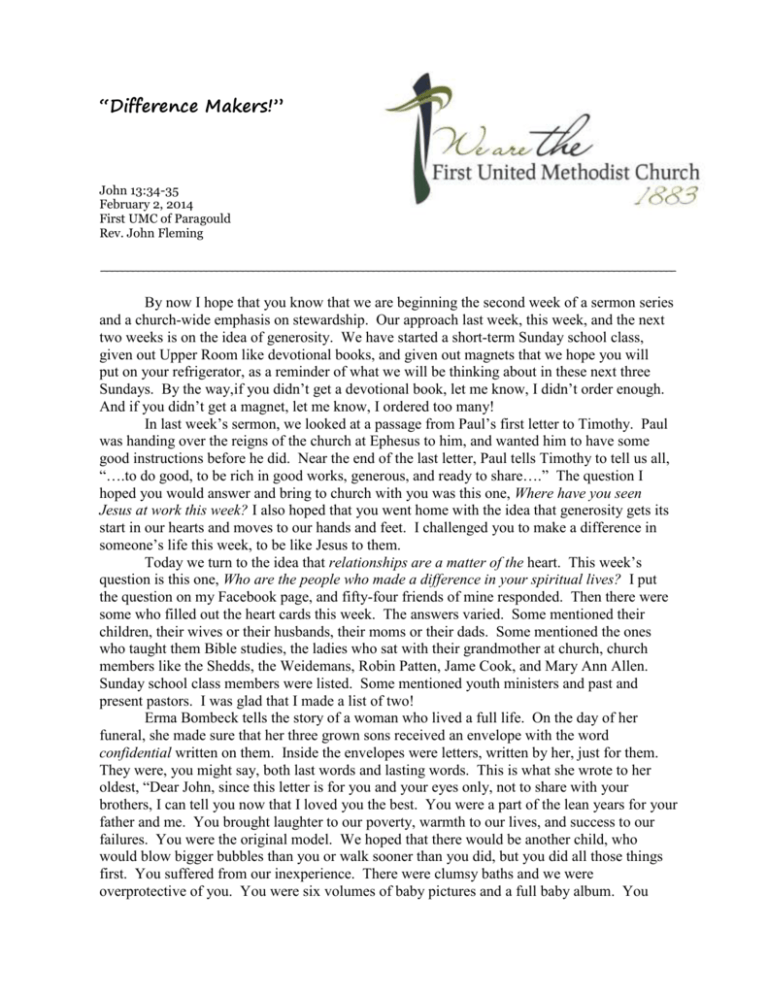
“Difference Makers!” John 13:34-35 February 2, 2014 First UMC of Paragould Rev. John Fleming ______________________________________________________________________________________________________________ By now I hope that you know that we are beginning the second week of a sermon series and a church-wide emphasis on stewardship. Our approach last week, this week, and the next two weeks is on the idea of generosity. We have started a short-term Sunday school class, given out Upper Room like devotional books, and given out magnets that we hope you will put on your refrigerator, as a reminder of what we will be thinking about in these next three Sundays. By the way,if you didn’t get a devotional book, let me know, I didn’t order enough. And if you didn’t get a magnet, let me know, I ordered too many! In last week’s sermon, we looked at a passage from Paul’s first letter to Timothy. Paul was handing over the reigns of the church at Ephesus to him, and wanted him to have some good instructions before he did. Near the end of the last letter, Paul tells Timothy to tell us all, “….to do good, to be rich in good works, generous, and ready to share….” The question I hoped you would answer and bring to church with you was this one, Where have you seen Jesus at work this week? I also hoped that you went home with the idea that generosity gets its start in our hearts and moves to our hands and feet. I challenged you to make a difference in someone’s life this week, to be like Jesus to them. Today we turn to the idea that relationships are a matter of the heart. This week’s question is this one, Who are the people who made a difference in your spiritual lives? I put the question on my Facebook page, and fifty-four friends of mine responded. Then there were some who filled out the heart cards this week. The answers varied. Some mentioned their children, their wives or their husbands, their moms or their dads. Some mentioned the ones who taught them Bible studies, the ladies who sat with their grandmother at church, church members like the Shedds, the Weidemans, Robin Patten, Jame Cook, and Mary Ann Allen. Sunday school class members were listed. Some mentioned youth ministers and past and present pastors. I was glad that I made a list of two! Erma Bombeck tells the story of a woman who lived a full life. On the day of her funeral, she made sure that her three grown sons received an envelope with the word confidential written on them. Inside the envelopes were letters, written by her, just for them. They were, you might say, both last words and lasting words. This is what she wrote to her oldest, “Dear John, since this letter is for you and your eyes only, not to share with your brothers, I can tell you now that I loved you the best. You were a part of the lean years for your father and me. You brought laughter to our poverty, warmth to our lives, and success to our failures. You were the original model. We hoped that there would be another child, who would blow bigger bubbles than you or walk sooner than you did, but you did all those things first. You suffered from our inexperience. There were clumsy baths and we were overprotective of you. You were six volumes of baby pictures and a full baby album. You were fresh grandparents who woke you up just so they could hold you. You were too many doctor’s call for rashes and gas. You were the beginning and you were loved.” To her second son, she wrote, “Steve, you probably already know this, but of my three sons, you were my favorite. You wore faded cloths and played with hand me down clothes. You never did anything first, but it didn’t stop you from doing all things well. You were the child that your dad and I relaxed with. It was with you that we realized that a dog can kiss you in the face and you could miss a nap amd that neither would kill you. You were a part of our busy and ambitious lives. You were the checking account with a dollar in it. You were the house that we could not afford, but bought anyway because we wanted a home. You were constant and dependable, and loved!” To her third child, the baby, she wrote these words, “Son, I know that I’m not supposed to have favorites, but I loved you the best. You arrived when your dad and I were older. You helped us realize that we still had a lot of love to give. You inherited trains that no longer worked and toys that were worn out. Your baby book had almost no pictures in it. With you, we threw out the rule book and wrote our own. I loved you because you were patient and compassionate. You were the height of our lives, and you were loved!” Now my guess is that if they were here this morning and filled out one of our heart cards, asking who it was that made a spiritual impact on their lives, those three boys would probably write down these two words, “My mother.” I think the common denominator on the cards and the posts and in that story is that love was offered. The ones who impacted our lives, spiritually, loved us enough to spend time with us. They prayed for us. They taught us. They cared for us. They loved us! So the suggested scripture lesson for our second sermon on Extravagant Generosity, this sermon series, seems perfect. The passage is just two verses long and comes from the section in John’s gospel that we’ve come to call the Farewell Discourse John is the only one who records what we might call Jesus’ last and lasting words. Jesus knows that his time with his followers is fleeting. He has little time left. It’s in these chapters that we sit with Jesus and the disciples at that table in the Upper Room. We’ll relive that night, that meal, in a few minutes. Among the other things that he did that night, he got up from his place at the table, came around and washed the feet of the disciples, giving them the lesson that they are to serve and to love. A little later, Jesus walks down the steps of the house, reaches for a vine that had begun to grow wildly, he redirected it, and gave disciples of another lesson, “I am the vine. You are the branches. It’s best to stay connected to me!” It’s also in these verse that Jesus changes the relationship with these twelve. From this point on, he will call them friends. I don’t know how it is for you, but I like the idea of being Jesus’ friend! It is also in these verses that Jesus gives disciples of every age a new commandment, a new rule, and new expectation. It’s this one, “I give you a new commandment, that you are to love one another as I have loved you, you also should love one another. By this everyone will know that you are my disciples, if you have love for one another.” And so I wonder, church, if you did not tell anyone, would the people that you come into contact with know who you follow? Love, you see, is supposed to be our defining characteristic. Love is supposed to make us distinct. Love is supposed to be our legacy! I heard about a pastor who was appointed to a new church. He was excited about his new assignment and the church was excited, too. Both had high hopes. The church also had high expectations. Most churches do and they should. On his first Sunday, he used the lesson that I read for you just a few short minutes ago. He read, “I give you a new commandment, that you love one another.” The congregation was pleased with his sermon, but the following Sunday they were surprised when he read the same lesson and preached the exact same sermon. No one said anything to him. Then on the Sunday after that, he used the scripture lesson again and preached the same sermon a third time. The church complained to the leadership. One of the church’s leaders went to the pastor and asked the obvious question, “Why are you preaching the same sermon every week?” This is what he said; this was his answer, “When the church starts practicing that sermon, I’ll write a new one!” It is important that we get the idea of loving others right! Now, if we weren’t in the middle of this sermon series, I might spend the rest of our sermon time today talking about the ins and outs of loving one another, how hard that can be sometimes, and sometimes, easy. But today, I want us to think about those who have showed us love, the ones who helped us along, people who were difference makers for us. It is what our heart card question is all about. Some people on our list are related to us, some are our friends, but a lot of the names I saw, were people in this church, past and present. This Extravagant Generosity idea comes from Bishop Robert Schnase. It’s one of what he calls the Five Practices of Fruitful Congregations. He wrote a book about those practices. This is some of what he said about generosity. “Every sanctuary and chapel where we have worshiped, every church organ that has lifted our spirits, every pew where we have sat, every communion rail where we have knelt, every hymnal from which we have sung, every praise chorus that we have seen projected on a screen, every church classroom where we have gathered with our friends, every church kitchen that has prepared our meals, every church van that has taken us on a trip, every church camp cabin where we have slept, are the fruit of someone’s generosity. We are the heirs of those who were touched by God’s generosity and decided to pass it along.” Could he be talking about us? Keep being generous, my kids are in this congregation! Do me a favor. Think again about whose name came to mind when you answered this week’s question, Who is it that has made an impact on your spiritual life? In your mind’s eye, talk to them. Thank them for the legacy they passed on to you. Then change gears. Imagine that it is many years from now. Someone has just come up to you. They look you in your eyes, and they say, “Thanks for what you did. Thanks for what you gave. Thank you for loving me, even when you didn’t know me.” Think about it, friends! (Special thanks to Bishop Robert Schnase who came up with the idea of the Five Practices of Fruitful Congregations. Thanks to Erma Bombeck for the story in the first part of this sermon. And thanks to all who made generous gifts on my behalf through the years so that the church could nurture and help me become who I am)
